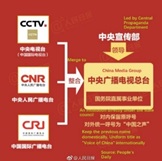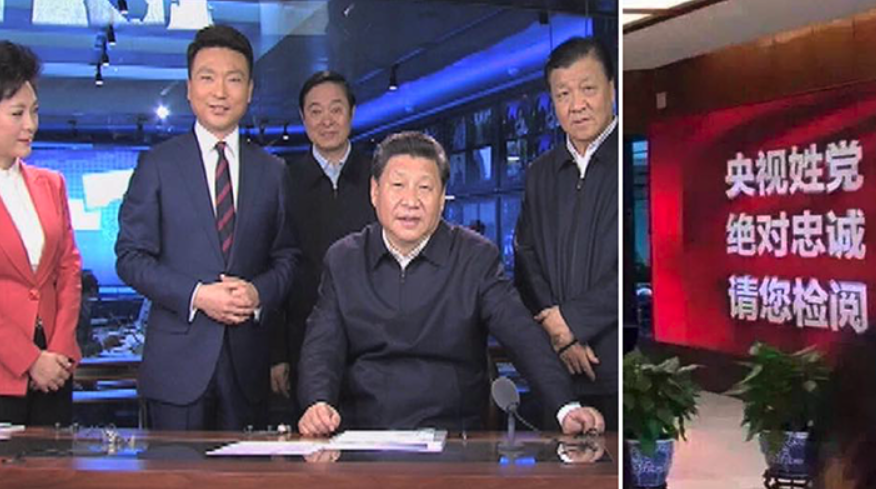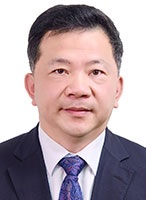New violation exposes Chinese TV to automatic loss of license in the UK
Safeguard Defenders sent an open letter to the UK's TV-regulator Ofcom today [25 February 2020], requesting an investigation into allegations that China Global Television Network (CGTN) is violating UK broadcasting law and Ofcom's own Guidelines, that prohibits any media organization from being owned or controlled by a political body, and for its license to be revoked.
The information presented below accompanies the open letter we sent Ofcom. It lays out evidence that since 2018, CGTN has been violating fundamental parts of UK law governing TV broadcasting for license-holders by being unequivocally controlled and also arguably owned by the Chinese Communist Party. In essence, both the substantive law (the Broadcasting Act of 1990), as well as operational guidelines by Ofcom itself, are entirely clear, and offer no exceptions to the following rule: no TV broadcaster may be granted or retain a license if they are owned or controlled by a political body.
Why is this important? Unlike other types of complaints that can be filed, this is unique in that there is no space for interpretation. Should Ofcom verify the information provided - all of which is drawn from official sources - there can be only one outcome, as laid out clearly in the law - and that is the revocation of CGTN's license.
Our letter comes little more than a week after the US State Department declared five Chinese media, including CGTN, as government entities under the Foreign Missions Act.
Information on CGTN’s controlling and owning entities
All information herein presented is drawn from official documentation from either the TV broadcaster (it publicly states on its website, repeatedly, that it is controlled by a political body), regulations and announcements from the Chinese State, and official documentation from the Chinese Communist Party (CCP) itself. The information presented in italics are translations of the words of the Chinese State, the CCP and CGTN themselves (except for emphasis marks rendered in bold or underlined).
“The leadership of the Chinese Communist Party is the basic nature and character of socialism with Chinese characteristics. Party, government, army, society and education — east and west, south and north, the Party leads all.”
- From the official media reorganisation program
Before the reorganisation (when CGTN was granted its license)
Before the major reorganisation of 2018, control over CCTV was primarily the responsibility of the State Administration of Press, Publication, Radio, Film and Television (SAPPRFT). SAPPRFT was a ministry-level agency under the State Council (the cabinet of ministers of the Chinese government). Its main task was the administration and supervision of state-owned enterprises engaged in the television and radio industries, such as CCTV (national and international broadcasts). This body led the media but also oversaw its coordination, inspection, organization and management, thus it was in direct control. Despite clear and acknowledged interference from the CCP, it was argued that CCTV and CGTN were “State media”.
The reorganisation[1]
Following the announcement of the reorganisation, the program for that reorganisation, developed and released by the CCP, called “Program for the Deepening Reform of Party and Government Organs” [2] was released. This document, in clear and direct language, specifies the purpose of the reorganisation, and what is now its current operation.
Above all, it places news and culture work under “unified leadership of the Party”, not the State: “The Central Propaganda Department[3] [an organ of the CCP] has unified supervision over news and publishing work.”
The creation of the National Radio and Television Administration (NRTA) – which replaced SAPPRFT in 2018 - seeks to “centralize and unify CCP leadership of news and public opinion work” and to “develop the role of radio and television into the mouthpiece of the party”.
It states that the chief responsibility of this new organ is to “implement the Party’s propaganda guidelines and policies”, “to supervise, manage and censor the content and quality of radio, television and online audiovisual programming” and, importantly for its international expansion, “to coordinate the promotion of the going out [overseas broadcast] of the radio and television section.”[4]
It furthermore states what tasks the reorganised CCTV shall undertake:
“Its principal responsibilities will be to propagate the theories, political line and policies of the Party; to plan and manage major propaganda reports; to organize the production of radio and television; to produce and broadcast premium radio and television products; to channel hot social topics; to strengthen and improve supervision by public opinion, to promote the integrated development of multimedia; to strengthen the building of international broadcasting capacity; to tell China’s story well.”[5]
Effects of the reorganisation
The reorganisation program also goes into more detail, stating under a section headlined “The creation of the National Radio and Television Administration”:
“In order to strengthen the Party’s centralized and unified leadership of news and public opinion work, and strengthen the management of important propaganda, firmly grasping the right of leadership over ideological work, adequately develop the role of radio and television as the mouthpiece of the Party, the National Radio and Television Administration, a department directly under the State Council, will be built…” (- section 35 of the program)
It outlines the main tasks of CCTV:
“Adherence to correct guidance of public opinion, placing a high priority on the building and innovation of dissemination methods, raising the dissemination force, guiding force, influence and credibility of news and public opinion.” (- section 36 of the program).
It also states, outright, that the institution (CCTV) will be led by the Central Propaganda Department:
“ [it] will serve as an institution directly under the State Council, returning [CCTV] to the leadership of the Central Propaganda Department [of the CCP].”
This reorganisation received less coverage internationally than in China, but was covered by the New York Times[6], which summarized how news organisations are being moved from State to Party control.
Ownership of CCTV, as well as two other media companies, was transferred to the China Media Group (CMG), a holding company created on April 19, 2018[7] and founded for this purpose, and whose dual parents/owners are the Central Propaganda Department of the CCP and the State Council. China Global Television Network (CGTN), the international arm of CCTV, on its own website, makes clear, through two instances, that its ownership and control lie in the Propaganda (aka Publicity) Department:

- On ownership
“China on Thursday held an inauguration ceremony for the China Media Group, a new broadcasting platform made up of China Central Television (CCTV), China Radio International (CRI) and China National Radio (CNR).
Huang Kunming, member of the Political Bureau of the Communist Party of China (CPC) Central Committee and head of the Publicity Department of the CPC Central Committee, and President of the China Media Group Shen Haixiong attended the event.
The China Media Group now comes under the Publicity Department and is tasked with the enhancement of China's international broadcasting capacities and promoting the convergence of the three platforms.” [8]
- On control
 “A state radio and television administration will be established by unifying the three broadcasters, according to a plan by the Central Committee of the Communist Party of China (CPC) unveiled on Wednesday, one day after the first session of the 13th National People's Congress (NPC) concluded.
“A state radio and television administration will be established by unifying the three broadcasters, according to a plan by the Central Committee of the Communist Party of China (CPC) unveiled on Wednesday, one day after the first session of the 13th National People's Congress (NPC) concluded.
China Global Television Network (CGTN), the group of six international language channels launched by CCTV on December 31, 2016, is also included in the merger.
The new platform will come under the Publicity Department, and is tasked with the enhancement of China's international broadcasting capacities and promoting the convergence of the three platforms.
The setup will also spread the Party's guiding principles and policies.” [9]

 The People’s Daily, the official newspaper of the Chinese Communist Party, celebrated the reorganisation by publishing a graphic showing the control and leadership of the media by the Propaganda Department[10]. Shortly thereafter CCTV itself, in broadcasts and on its website, announced that according to the government’s official institutional reform plan “the main responsibility of CCTV is to publicize the Party's theory and policies, coordinate and organize major publicity reports, organize radio and television production, produce and broadcast premium radio and television, and guide society”. Key issues, it further said, were to “…strengthen and improve supervision of public opinion.”
The People’s Daily, the official newspaper of the Chinese Communist Party, celebrated the reorganisation by publishing a graphic showing the control and leadership of the media by the Propaganda Department[10]. Shortly thereafter CCTV itself, in broadcasts and on its website, announced that according to the government’s official institutional reform plan “the main responsibility of CCTV is to publicize the Party's theory and policies, coordinate and organize major publicity reports, organize radio and television production, produce and broadcast premium radio and television, and guide society”. Key issues, it further said, were to “…strengthen and improve supervision of public opinion.”
The same information was also released on the public website[11] of the CCP’s Central Propaganda Department, the department of the CCP that now controls all key Chinese media. It was also echoed[12] in news releases by the official Xinhua news agency.
In addition, all journalists working for CCTV are bound by the Code of ethics in journalism, which was revised and published on 15 December 2019[13], and states, amongst many other things, that journalists and media shall:
- Persist in arming the mind with Xi Jinping Thought on Socialism with Chinese Characteristics for a New Era, thoroughly study, publicize, and implement the Party's path and directives… (paragraph 1.1)
- With economic construction as the centre, obey and serve the overall picture of the Party (paragraph 2.1)
- … obey the Party discipline on news work… (paragraph 6)
- Vividly elucidate the Chinese path, Chinese theory, Chinese system, and Chinese culture; emphasizing doing a good job of telling China's story, the CCP's story, the story of socialism with Chinese characteristics… (paragraph 7.2)
Shortly before the new code was announced, UK media reported[14] on the greater stress for loyalty to the Chinese Communist Party, as opposed to the State, as Xi Jinping, the leader of the CCP, asked for “absolute loyalty”.

Photo : A sign inside the newsroom of CCTV at their Beijing headquarters[15], reading “CCTV’s surname is “The Party”, [We are] absolutely loyal, ready for your inspection”.
Directorship: Shen Haixiong, CMG President and CCP Central Propaganda Department key Executive
 China Media Group: The current president of this media corporation, which includes CGTN, is Shen Haixiong[16]. Shen is also deputy minister of the CCP’s Central Propaganda Department, Secretary of the Party Leadership Group and Director of China Central Radio and Television[17] and an alternate member of the Central Committee of the CCP. In a speech held at the CMG on July 2, 2018, Shen said:
China Media Group: The current president of this media corporation, which includes CGTN, is Shen Haixiong[16]. Shen is also deputy minister of the CCP’s Central Propaganda Department, Secretary of the Party Leadership Group and Director of China Central Radio and Television[17] and an alternate member of the Central Committee of the CCP. In a speech held at the CMG on July 2, 2018, Shen said:
[The CMG] “Must aim the political direction, adhere to the party's political leadership… fulfill the duties with the mission of important news platform of the party, strive to improve the communication capabilities, tell the Chinese story well, and reassure the party and satisfy the people.”[18]
Recent developments
In 2018, the U.S. State Department classified CGTN as a foreign agent, requiring it to file information to the U.S. government under its Foreign Agents Registration Act (FARA). This was widely reported in both UK and international media, and their first filing was made in early 2019, to continue on an annual basis.
On February 18, 2020 the U.S. took further steps against CGTN, as well as Xinhua News Agency, China Radio International, the parent company of China Daily newspaper, and the parent company of The People’s Daily newspaper, as one State Department official described the five Chinese news organizations as “part and parcel of the P.R.C. propaganda apparatus”. All five meet the definitions of "foreign missions" under the Foreign Missions Act, according to the State Department. This new designation will force stricter reporting rules on CGTN in the U.S., as they are deemed not journalistic entities but operatives of a propaganda apparatus. This was widely covered in international media, including in the UK, with The New York Times[19] breaking the story.
Legal basis for why CGTN is holding a license in violation of law
Ofcom guidelines for license holders, as well as its Broadcasting Code, are based on the comprehensive Broadcasting Act of 1990. Relevant sections of this law, as it applies to this complaint, are presented below. Parts of this are also codified in the TLCS Guidance notes for license applicants and TLCS Guidance notes for licensees.
Broadcasting Act 1990 (amended by the Broadcasting Act 1996 and the Communications Act 2003)
The Broadcasting Act 1990 (and its amendments) form the basis for the submission of all the above information, in particular the section 5 of the Act which states:
(1)[F1OFCOM] shall do all that they can to secure—
(a) that a person does not become or remain the holder of a licence if he is a person who is a disqualified person in relation to that licence by virtue of Part II of Schedule 2 to this Act;
(…)
(5) Every licence shall include such conditions as [F1OFCOM] consider necessary or expedient to ensure that where—
(a) the holder of the licence is a body, and
(b) a relevant change takes place after the grant of the licence,
[F1OFCOM] may revoke the licence by notice served on the holder of the licence and taking effect forthwith or on a date specified in the notice.
And Part II (Disqualification for Holding Licences) of Schedule 2 to the Act, which states that:
General disqualification of non-EEC nationals and bodies having political connections
1(1)Subject to [F1sub-paragraph (1A)], the following persons are disqualified persons in relation to [F2a Broadcasting Act licence]—
F3 (a). . . . . . . . . . . . . . . . . . . . . . . . . . . . . . . .
F3 (b). . . . . . . . . . . . . . . . . . . . . . . . . . . . . . . .
(c) a local authority;
(d) a body whose objects are wholly or mainly of a political nature;
(e) a body affiliated to a body falling within paragraph (d);
(f) an individual who is an officer of a body falling within paragraph (d) or (e);
(g) a body corporate which is an associate of a body corporate falling within paragraph (d) or (e);
(h) a body corporate in which a body falling within any of paragraphs (c) to (e) and (g) is a participant with more than a 5 per cent. interest;
[F4 (hh) a body corporate which is controlled by a body corporate falling within paragraph (h);]
(i) a body which is controlled by a person falling within any of paragraphs [F5(c)] to (g) or by two or more such persons taken together; and
(j) a body corporate in which a body falling within paragraph (i), other than one which is controlled—
(i) by a person falling within paragraph F6... (f), or
(ii) by two or more such persons taken together,
is a participant with more than a 5 per cent. interest.
[2] Program for the Deepening Reform of Party and Government Organs http://chinamediaproject.org/2018/03/22/when-reform-means-tighter-controls/
[3] CCPPD has several Chinese names with various different English translations, it is officially the Zhōngguó Gòngchăndǎng Zhōngyāng Wěiyuánhuì Xuānchuánbù "Chinese Communist Party Central Committee Propaganda Department" or Zhōnggòng Zhōngyāng Xuānchuánbù "Chinese Communist Party Central Propaganda Department" or "Central Propaganda Department of the Communist Party of China", colloquially abbreviated as the Zhōnggòng Xuānchuánbù "Chinese Communist Party Propaganda Department" or "Propaganda Department of the Communist Party of China", or simply Zhōng xuānbù. It has been renamed Publicity Department in English although its Chinese appellation never changed.
[4] Section 35 of the program for the Deepening Reform of Party and Government Organs http://chinamediaproject.org/2018/03/22/when-reform-means-tighter-controls/
[5] Section 36 of the program for the Deepening Reform of Party and Government Organs http://chinamediaproject.org/2018/03/22/when-reform-means-tighter-controls/
[6] https://www.nytimes.com/2018/03/21/world/asia/china-communist-party-xi-jinping.html
[11] http://www.wenming.cn/bwzx/dt/201804/t20180419_4660236.shtml
[12] http://www.xinhuanet.com/zgjx/2018-04/19/c_137121831.htm
[14] https://www.theguardian.com/world/2016/feb/19/xi-jinping-tours-chinas-top-state-media-outlets-to-boost-loyalty
[15] https://www.scmp.com/news/china/policies-politics/article/1914136/chinas-top-party-mouthpieces-pledge-absolute-loyalty
[19] https://www.nytimes.com/2020/02/18/world/asia/china-media-trump.html?searchResultPosition=1